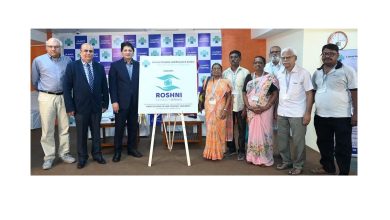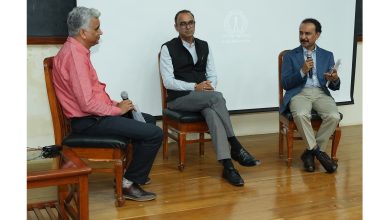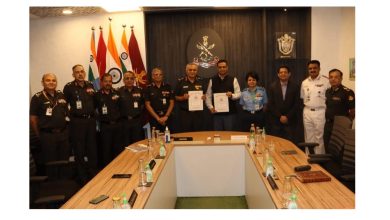Karnataka health minister commends Narayana Nethralaya’s initiative in eye organ donation

Appoint Dr Bhujang Shetty, Chairman, Narayana Nethralaya, to lead a committee on delivering ophthalmological care at a policy level
Karnataka’s Health & Family Welfare and Medical Education Minister Dr K Sudhakar commended the initiative of Narayana Nethralaya, Asia’s premier eye hospital, in driving awareness for organ donation, which had come down severely across the state due to COVID-19 era and expressed his desire to replicate the model with other healthcare institutes along with the premier eye care provider. Also, he announced his plans to appoint Dr Bhujang Shetty, Chairman, Narayana Nethralaya, to lead a committee on delivering ophthalmological care at a policy level.
Dr Sudhakar made these announcements at a programme on ‘Eye Donation’ as part of the National Programme for Control of Blindness in the area of avoidable and preventable blindness, focusing on corneal blindness, corneal transplants, and restoration of sight, organised by Narayana Nethralaya on the threshold of 27 years of service in its pledge to bring sight to the blind through its Dr Rajkumar Eye Bank. The programme was organised to update medical, paramedical, technical staff, and volunteers about new developments.
Inaugurating the programme, Dr Sudhakar said Narayana Nethralaya had emerged as a role model for driving awareness initiatives for organ donation, including eye donation, which had reduced drastically due to COVID-19 pandemic.
“Their efforts are highly commendable and worth replicating, as we need to revive organ donation, we intend to take this up at the state level by enlisting the support of other hospitals,” he said.
Recognising the yeoman service of Dr Shetty, Dr Sudhakar added, “I have appointed eminent people to various health committees. Likewise, Dr Shetty will head a Committee to prepare a blueprint for ophthalmological care. His recommendations will be part of the state healthcare policy concerning eye care.
“The minister also sought the help of youth to spread the importance of eye donation. In India, every household should pledge to donate eyes and bring light into others’ lives,” he said.
“In the last 8 to 10 months, organ donation has largely suffered across the nation because of fear psychosis among people in visiting hospitals. Eye donation is a noble cause, and we should all come forward to donate eyes in saving as well giving sight to those in need,” the minister said.
The minister also urged healthcare professionals to remove misconceptions among people about organ donations, especially eyes, and encourage the wider sections of society.
“We have to arrive at a social credit system to encourage organ donation,” Dr Sudhakar added.
Lauding the efforts of Narayana Nethralaya in holding the symposium, Dr Sudhakar said that Narayana Nethralaya’s service is not limited to the treatment of eyes alone, but in conducting various conferences, training programmes, seminars, quiz, and competitions which helps in unfolding the creative potentialities, and talent of our children, students, and amateurs. “This is the hallmark of Narayana Nethralaya,” he added.
Dr Shetty made a forceful plea on the importance of eye donation, as the corneal disease is a major cause of blindness accounting for 7.1 per cent of India’s blind population. He appealed for pledging of eyes, as annually only 10 of the required 400,000 corneas were available for transplanting.
“Eye donation is not only a sight giver but an eye saver. Eye donations had come to a halt during the first three to four months after the outbreak of the pandemic. Even now it is down by more than 60 to 70 per cent,” Dr Shetty said.
“Many people lost sight during the pandemic because eye hospitals could not carry out the therapeutic graft. When people developed ulcers in a normal eye, they lost eyes because there were not enough eyes to do the grafting. Therapeutic grafting is important to save the sight,” he informed.
“When a normal person gets corneal ulcer, his eye gets perforated and in such a situation he not only loses the eye but also loses the sight if he doesn’t get timely treatment. We use the donated eyes to perform a therapeutic graft which can save the eye from perforating. We can save the integrity of the eye so that the person can have normal eye and normal sight in the future,” Dr Shetty explained.
“People with an eye injury or eye ulcers came late for treatment in an advanced stage. When people needed the therapeutic graft to save the eyeball and eyesight, we never had any because nobody came forward to donate eyes,” he added.
On average, Narayana Nethralaya used to collect 150 to 200 eyes every month, now it is collecting only 30 to 40.
Narayana Nethralaya along with the Dr Rajkumar Eye Bank, Eye Bank Association of India, private hospitals, and other groups is proactively promoting eye donations and collections.
“We aim to collect the eyes from the hospital itself where the person dies under the Hospital Corneal Retrieval Programme. For this, we require the support of hospital managements to support the grafting procedure and in counselling the patients and their relatives,” Dr, Shetty said.
Currently, there is over 3 million corneal blind requiring corneal transplants and there is an urgent need to push the programme aggressively, Dr Shetty informed.
Corneal blindness is considerable health and economic burden as it affects the relatively younger but generally economically productive population. Narayana Nethralaya has carried out over 50,000 corneal transplants.
G Ganesh, Executive Director, EBAI (Eye Bank Association of India), said, “One eye donation can give sight to two or more corneal blind persons.” He spoke on the new Transplant Act and tried to remove some of the misgivings on donations.




